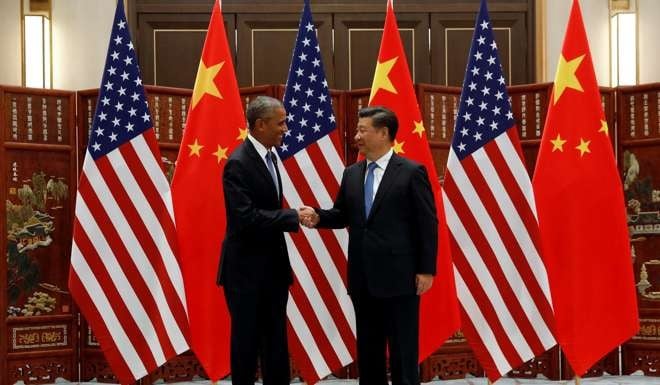
Little real progress seen in Xi’s sit-down with Obama
Analysts say keeping focus on climate-change deal is a way to gloss over serious tensions between leaders of China and US

Despite the ratification of a landmark climate-change deal on the eve of the Group of 20 (G20) summit, the presidents of China and the US made little headway on easing tensions between the world’s top two economies.
The talks between Xi Jinping and Barack Obama laid bare the discord and growing animosity over a range of trade and security disputes, observers said.
Intriguingly, statements made separately late on Saturday night by the White House and the Chinese foreign ministry both described the meeting between Xi and Obama as “candid”, which in diplomatic language is a synonym for tough talks with few results.
“Obama’s candid talk with Xi is poorly timed, as it will have next to no effect,” said Steve Tsang, a senior fellow at the China Policy Institute at the University of Nottingham. “Xi knows Obama is on his way out and will just wait him out or essentially ignore what Obama might have said,” he said.
Shi Yinhong, director of the Centre for American Studies at Renmin University in Beijing, said that although the two leaders touched on some 20 bilateral, regional and global issues, there was little progress.
“Nor did they ease their tough stances on the South China Sea disputes,” Shi added.
Xi and Obama spoke about the recent international tribunal’s ruling on the South China Sea disputes, according to a White House statement. Beijing saw the ruling, which denied its territorial claims, as a major sore point.
Pang Zhongying, another analyst at Renmin University, said that despite tough talk on maritime security and human rights, Obama appeared more obsessed with his diplomatic legacy, notably on climate change.
“Apparently, the best China and the US can achieve at the moment is to agree to disagree on almost all the major bilateral issues,” he said.
Despite their differences, both leaders clearly understood the importance of the China-US relationship, analysts noted.

“The fact that Xi, who obviously has a very tight schedule during the G20, still allocated much more time to talk to Obama shows Xi still gives top priority to his ties with Obama,” Pang said.
In return, Obama tried hard not to embarrass his host and spoke highly of his talks with Xi. “The bilateral discussions that we had yesterday were extremely productive and continue to point to big areas of cooperation,” he said yesterday.
Instead, Obama may choose to confront China at the upcoming summit involving the Association of Southeast Asian Nations, to be held in Laos from Tuesday, where Obama and his allies are expected to jointly raise the South China Sea disputes. Premier Li Keqiang (李克強) will attend.
Analysts agreed that the tension between the two powers would remain a growing trend in the coming months.
Tao Wenzhao, a research fellow at the Chinese Academy of Social Sciences, said there was an understanding between China and the US to maintain relatively stable relations for the last five months of Obama’s presidency.
The two nations will continue to remain at odds over a range of issues including maritime disputes and cyber security. “The only consensus is that the two countries do not want to go to war because of the South China Sea disputes,” Tao said.
Analysts also said the climate-change announcement was clearly aimed at glossing over their deep-rooted tensions, which suited both Xi and Obama.
Shi said that while the announcement of an agreement was only a move to “reconfirm” their previous commitments, “the atmosphere would have been even worse without such a step” .
Tsang also said the ratification of the Paris Agreement on climate change, which was not a bilateral issue, was “the key element of Beijing’s plan to project the global perception of its successful leadership of the G20 summit in Hangzhou”.
“How well it will be implemented will take a long time to be proven, one way or the other, but the announcement gave China a guaranteed diplomatic success.”